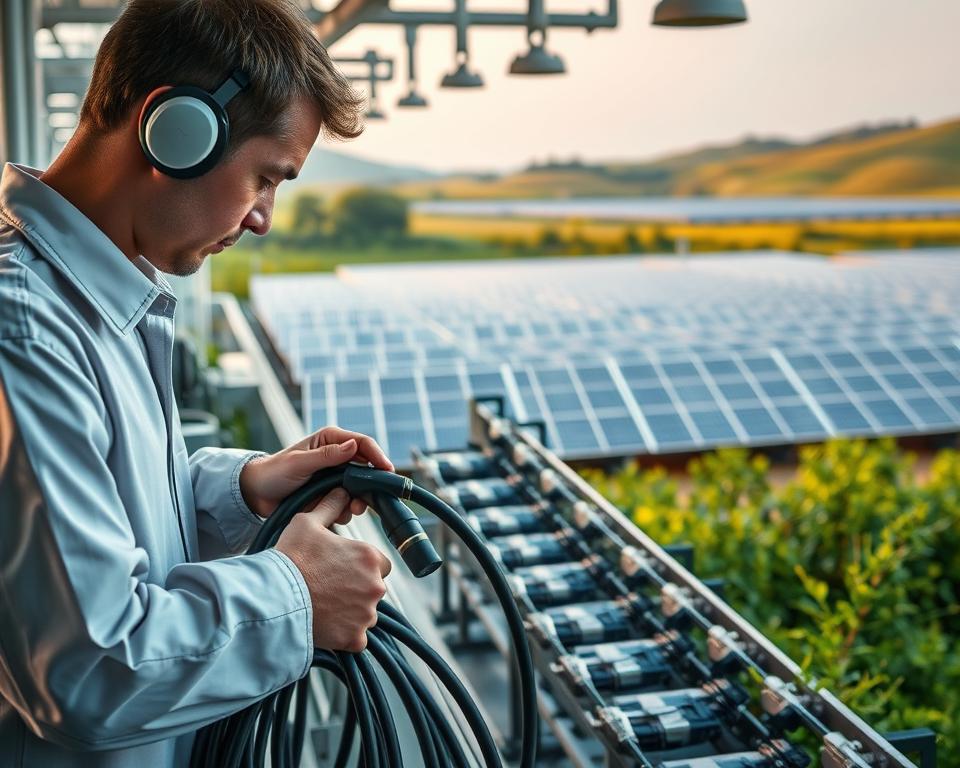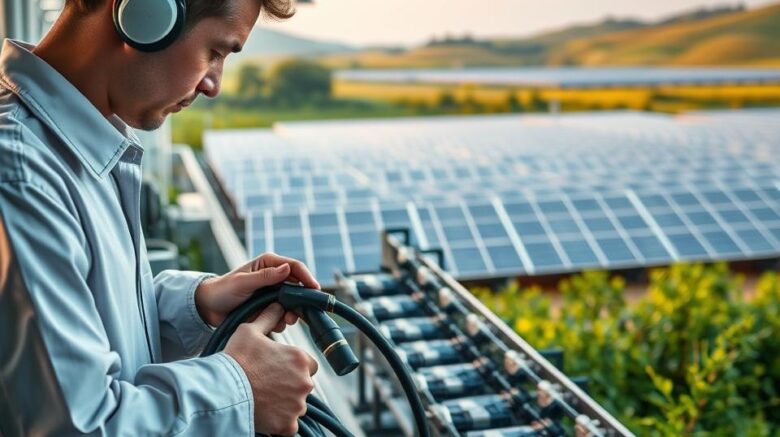Best EV Charging Cable Manufacturers for Your Electric Vehicle
EV adoption is booming, with the demand for reliable and fast charging solutions increasing sharply. As of now, top brands have been at the forefront of this change, providing premium charging infrastructure. Southwire, for instance, has been a significant player since 2014, boasting over 1000 five-star reviews and 75 years of experience in the electrical construction industry.
The surge in electric vehicle adoption drives demand for robust, fast, and reliable Charger Manufacturers in China. Key suppliers are innovating to address changing requirements, offering products that improve the overall charging experience.
Knowing the variations between various charging solutions matters for selecting wisely. High-grade charging infrastructure directly influences vehicle performance and user experience.
Major Highlights
- Key suppliers deliver top-tier cables enhancing lifespan and protection.
- The demand for efficient charging infrastructure is on the rise with the growth of the electric vehicle market.
- Leading companies innovate to meet the evolving needs of electric vehicle owners.
- High-grade cables improve energy transfer and driving range.
- Opting for top-tier cables yields future savings.

The Growing Importance of Quality EV Charging Cables
As electric vehicles become increasingly popular, the significance of premium EV charging cables is immense. The performance, security, and reliability of electric vehicle charging systems rest on the quality of the charging cables used.
Advancements in EV Charging
Charging tech for EVs has evolved rapidly, with a priority on speedy charge times and enhanced protections. Modern EV charging cables are built for these requirements, featuring high-grade materials and advanced designs to minimize energy waste and maximize transfer rates.
The Case for Premium Charging Infrastructure
Premium cables enhance both safety and functionality in EV systems. Robustness, such as all-weather performance and flexibility in extreme temperatures, ensure reliable operation across various environments. Moreover, regulatory compliance and adherence to industry guidelines are essential in ensuring that cables meet rigorous safety requirements.
| Key Features | Benefits |
|---|---|
| High-grade build quality | Minimized power loss during energy transfer |
| Robust durability | All-weather reliability |
| Regulatory compliance | Certified safety |
| Maintainability | Long-term value proposition, reduced waste |
Our high-performance cable solutions, such as those offered by Aichie Tech Electronics, are tested for quality and compliance in The Cable Lab. By opting for serviceable Portable EV Charger, users can save hundreds over a decade by choosing repairs over replacements, lowering environmental impact.
Premier Chinese EV Cable Suppliers
A surge of cable makers in China supports the EV boom. They play a key role in global EV infrastructure, providing high-quality automotive cables designed for various charging needs.
Wottz: Industry Leaders Since 2014
Wottz has established itself as a prominent player in the EV charging cable market since 2014. They offer a range of cables that cover Mode 1–4 charging standards, including Mode 1, 2, 3, and DC Fast Charging (Mode 4).
Aichie Tech Electronics: 75+ Years of Electrical Expertise
Aichie Tech Electronics leverages 75 years of electrical expertise in its EV cables. Their products are designed to meet the demands of both domestic and commercial EV charging infrastructure.
Additional Key Cable Suppliers
Beyond industry leaders like Wottz and Southwire, other manufacturers are making their mark by focusing on specific automotive applications or technological innovations in electric vehicle charging. These include specialists in Type 1 (J1772) and Type 2 (Mennekes) connectors, as well as companies developing cables with enhanced flexibility and resistance to environmental factors.
Types of EV Charging Cables Explained
As electric vehicles become increasingly popular, understanding the various types of EV Charging Cable Manufacturers is crucial for optimal charging experiences. Knowing cable types ensures you pick the right charger. The variety in EV charging infrastructure demands a closer look at the different cable types available.
Type 1 vs Type 2 Explained
SAE J1772 (Type 1) and Mennekes (Type 2) are the main global standards. Type 1, also known as SAE J1772, is predominantly used in North America, while Type 2, or Mennekes, is the standard in Europe. The right cable matches your car and charger. Type 2 cables often handle greater power, making them ideal for speed.
Level2 and DC Fast Charging Solutions
Level 2 AC cables charge faster, up to 19.2 kW. DC Fast Charging cables, on the other hand, enable quick top-ups by on-site AC→DC conversion, delivering rapid fill-ups. These cables are essential for long-distance EV travel, letting EVs charge in minutes.
Portable and Tethered Cable Options
Granny chargers plug into home outlets for emergency use. Tethered cables are fixed to charging stations, providing a convenient but less flexible charging solution. The choice depends on the owner’s charging needs and preferences.
When selecting an EV charging cable, factors such as cable length, charging speed, and compatibility with the vehicle are crucial. For instance, portable charging cables range from simple L1 cords to full L2 kits. Vehicle-to-load (V2L) cables let EVs act as mobile power banks.
- Portable charging cables offer flexibility, with options ranging from basic to more robust Level2 solutions.
- Tethered cables are permanently attached to charging stations, limiting flexibility but eliminating the need for personal cables.
- Lengths vary from 5 m to 50 m—choose wisely.
Attributes of Premium EV Cables
Premium cables stand out for durability, safety, and performance. These features are crucial for maintaining the integrity of the charging process and safeguarding the vehicle and user.
Robustness and Weatherproofing
Durability and weather resistance are paramount in EV charging cables. Manufacturers like Wottz and Southwire craft their cables from recyclable materials that adhere to ROHS compliance, ensuring they perform in harsh climates. Their serviceable design facilitates easy maintenance and promotes recycling.
User-Friendly Design
Flexibility and ease of use are also critical factors. High-quality EV charging cables are built for easy handling without sacrificing strength. This flexibility does not compromise their durability, as they are built to withstand regular use.
Safety Certifications and Compliance Standards
Safety certifications and compliance with international standards are non-negotiable for reputable EV charging cable manufacturers. They ensure their products meet or exceed standards such as IEC62196 for connectors and UL2594 in North America. Independent labs verify safety, toughness, and weatherproofing.
| Certification | Description | Region |
|---|---|---|
| IEC62196 | Connector safety standards | International |
| UL2594 | Standard for electric vehicle supply equipment | North America |
| ROHS | Restriction of hazardous substances | International |
Emphasizing these attributes yields cables that are safe, durable, and user-friendly.
Next-Gen Charging Cable Tech
The latest developments in EV charging cable technology are revolutionizing the way we charge our vehicles, with a focus on ultra-fast charging, reliable data transfer, and eco-friendly materials.
Thermal-Managed Fast Charging
Cooling fluids enable higher charge rates, minimizing thermal throttling during high-power sessions.
Signal-Boosting Contact Designs
Hyperboloid contact points improve electrical connection, ensuring stable communication and power flow.
Sustainable and Recyclable Materials
Leading manufacturers are prioritizing sustainability in their cable designs, minimizing ecological footprint with RoHS-compliant, serviceable builds. For instance, companies like Aichie Tech Electronics and Wottz are embracing repairable designs and strict standards to foster reuse.
The industry’s shift towards sustainability includes the use of TPU jackets, avoidance of hazardous substances, and the development of take-back programs for end-of-life disassembly and material recovery.
Choosing the Perfect EV Cable
Choosing the right EV charging cable is crucial for efficient and safe charging. To make an informed decision, consider several key factors.
Connector Compatibility
Ensure the charging cable is compatible with your vehicle’s connector type. Your vehicle’s onboard charger capacity determines the maximum AC charging rate it can accept.
Determining the Optimal Cable Length
Choose a cable length that suits your charging needs. A longer cable adds reach at the cost of extra weight.
Power Rating & Charge Rate
Ensure cable amperage aligns with charger and car. Standard Level 2 home charging operates at 7.2 kW, but some vehicles support up to 19.2 kW with appropriate electrical service.
By considering these factors, you can select an EV charging cable that meets your needs and enhances your overall charging experience.
Final Thoughts on Premium EV Cables
As the electric vehicle market continues to expand, the importance of quality charging infrastructure cannot be overstated. Investing in premium EV charging cables from established manufacturers like Wottz and Aichie Tech Electronics ensures superior durability and lower lifetime costs. Their serviceable designs enable repairs over replacements to cut waste. This approach supports eco-friendly EV use.
Premium cables offer certification, future proofing, and reliability.
